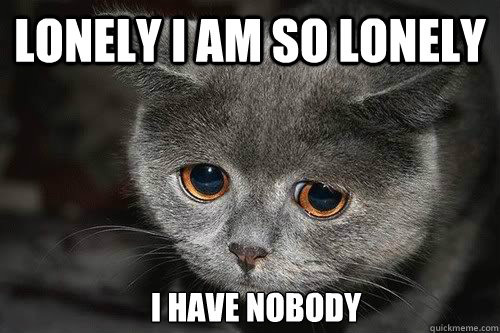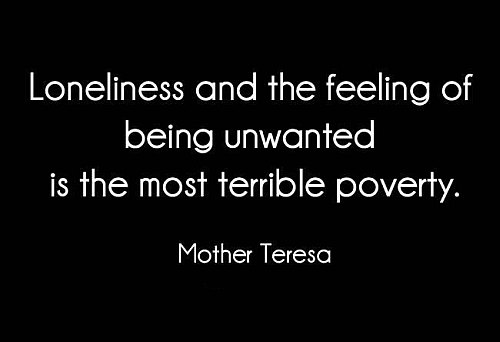The other night I was mucking round on Twitter and I came across this blog about loneliness. It says that being alone – or feeling alone – carries a mortality risk as high as smoking. You can literally die from loneliness.
I googled that and came up with this article, which claims that the subjective feeling of loneliness increases risk of death by 26%. The researchers at Birmingham Young University say this is the next big public health risk, “on par with obesity and substance abuse.”The original blog talks about the stigma associated with admitting you’re feeling alone. How it can make you feel like a failure, how you can question your right to feel that way. It also highlights that loneliness can make you more socially averse, and addresses the idea of a correlation between social media use and feeling alone.
I’m not sure why any of this came as a surprise to me. It shouldn’t. I have always felt alone. I had a huge problem with loneliness when I was younger. For most of my late childhood and early teens I lived alone with my father. We didn’t have a social household. I feel like I never really learned a lot of skills in terms of relating to people and building friendships. I never fit in at school, and I felt isolated by my depression, which seemed to me to be a completely unique experience. There wasn’t social media then, so I had no idea so many others my age would have been feeling the same.
That’s completely different now, of course. I have a wide social circle, and that includes many close friends who totally relate to my mental health challenges. But that hasn’t actually stopped me feeling lonely.
The blog quotes Stephen Fry saying that loneliness was the hardest part of his depression.
Lonely? I get invitation cards through the post almost every day. I shall be in the Royal Box at Wimbledon and I have serious and generous offers from friends asking me to join them in the South of France, Italy, Sicily, South Africa, British Columbia, and America this summer. I have two months to start a book before I go off to Broadway for a run of Twelfth Night there.
I can read back that last sentence and see that, bipolar or not, if I’m under treatment and not actually depressed, what the fuck right do I have to be lonely, unhappy, or forlorn? I don’t have the right. But there again I don’t have the right not to have those feelings. Feelings are not something to which one does or does not have rights.
In the end loneliness is the most terrible and contradictory of my problems.
I can relate to this. There’s no objective reason for me to be lonely. But, despite categorising myself as an introvert, I loathe being by myself. And I can just as easily feel lonely when I’m with people.
When I first got sick, I was living alone, and I can categorically say that was the worst time for my mental health ever. I was physically incapacitated, I was unable to work or socialise or exercise or eat properly – all of the things that help keep my depression handled. And though I often had visitors, that time alone was seriously dangerous, to both my mental and physical wellbeing.
This article in Slate links to research suggesting social isolation impairs immune function and boosts inflammation – which are obviously both huge issues for me.
As a social species, humans rely on a safe, secure social surround to survive and thrive. Perceptions of social isolation, or loneliness, increase vigilance for threat and heighten feelings of vulnerability while also raising the desire to reconnect. Implicit hypervigilance for social threat alters psychological processes that influence physiological functioning, diminish sleep quality, and increase morbidity and mortality.
Huh. That also sounds like anxiety. Huge surprise. NOT.
“Admitting you are lonely is like holding a big L up on your forehead,” says John T. Cacioppo, social neuroscientist at of the University of Chicago, and author of Loneliness: Human Nature and the Need for Social Connection. He studies how loneliness and social isolation affect people’s health. He admitted to being embarassed reading his own book in public. “For the first time I actually experienced the feeling of being lonely and everyone knowing it,” he says.
According to social scientists, technology like social media makes it easier to avoid developing substantive relationships in the flesh  and blood. I can see how this can be true, but it’s not quite like that for me. When I was house-bound – and with my physical limitations now – online communities were and are absolutely vital to my social contact, friendships, and mental health. I use it as a way to meet people who then become “flesh and blood” friends.
and blood. I can see how this can be true, but it’s not quite like that for me. When I was house-bound – and with my physical limitations now – online communities were and are absolutely vital to my social contact, friendships, and mental health. I use it as a way to meet people who then become “flesh and blood” friends.
Having said that, it doesn’t quite fill the quota. If I’m alone in the house all day with access to Twitter/Facebook etc, I will still feel alone and like I’m a loser for not having someone who wants to hang out with me right now, even though that’s a fallacy and totally illogical.
Doing this reading on loneliness – and I’d like to do a lot more – has helped me explore more why I have these feelings, and that they’re not unique. That makes me feel a little bit less like a big weirdo.
The person who wrote that blog says “This is not a cry for help, nor a request for assistance. It is a refusal to remain quiet despite the stigmas we have when discussing mental health. It’s me saying “hey, it’s not just you”, for as much good as that will do.”
So that’s what I decided to do, too.


Pingback: Outfit Post: 9/9/15 | Reading in Skirts